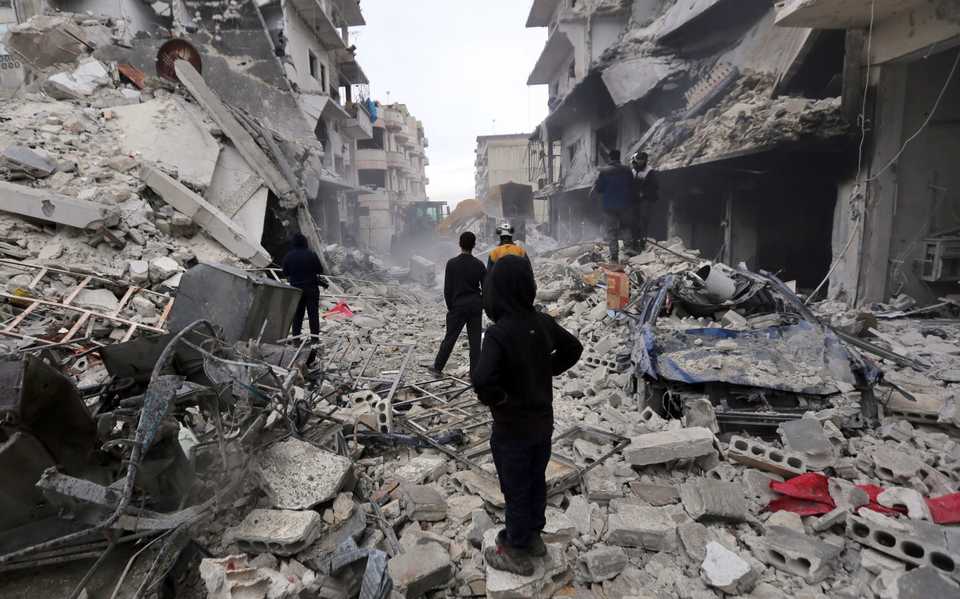The Assad regime’s bloody offensive in Syria’s Idlib province has led to violent clashes between Turkey and the regime forces, killing of seven Turkish soldiers and one civilian today by regime shelling violates the 2018 Ankara-Moscow agreement, which was meant to protect civilians and create de-escalation zones overseen by observation posts.
The common understanding in Ankara seems to be that Assad’s attacks were not only aimed at Turkish forces but also at the forces of “peace” at Syrian observation posts — a security measure taken by Turkey to ensure stability in the volatile region and prevent another major refugee flow toward Turkish and European borders.
As a result, it is believed that the Assad regime has targeted Turkey’s “peace forces,” who have fought against all odds to defend European borders and uphold the refugee deal between Ankara and the EU.
In light of recent and past events, Turkey expects a serious commitment from the EU because Turkish observation posts are also critical for the security of Europe, whose officials visit the war-torn province from time to time to take the stock of the Syrian conflict.
The recent wave of Syrian refugees at the border of Turkey have been photographed holding a large colourful banner that read: “From IDLIB to BERLIN.”
So far, Ankara has staged a strong military response to the regime attacks, killing at least 30 troops loyal to Assad, according to Turkey’s President Recep Tayyip Erdogan.
The president also warned Russia to stay away and not “stand in our way” as a large Turkish military convoy entered Idlib province to reinforce the observation posts.

Since the beginning of the Syrian civil war, Turkey has backed the Syrian opposition forces while Russia sided with the Assad regime. From 2015 onward, Moscow’s involvement grew in the region as it staged a military intervention in the civil war, sending its own troops and warplanes to attack anti-Assad forces.
The recent escalation in Idlib is a worrying sign for various reasons, ranging from an out-of-control refugee crisis, which is being worsened by Assad’s current offensive, to recently prospering Ankara-Moscow ties, which could be torpedoed by the clashes.
Turkey is angry at Russia, holding it responsible for allowing Damascus to violate several ceasefire deals between Ankara and Moscow. It also holds the international community to account for being silent to Assad-led onslaught in Idlib, playing deaf, dumb and blind as Turkey was left to shoulder the refugee burden.
Moscow has been playing a game of brinkmanship, trying to gain leverage in the Syrian civil war and reposition itself as a major power player in the region. But Turkey’s patience with Russia’s military manoeuvres is wearing thin.
“I want to especially tell the Russian authorities that our interlocutor here is not you but the [Syrian] regime, and do not stand in our way,” Erdogan told reporters before heading to Ukraine, where an ongoing conflict continues between Russia and the West over the country’s political direction.
Turkey has also grown weary of constantly violated ceasefires ensured by Moscow, which appears to give a diplomatic cover to Damascus’s attacks by negotiating so-called ceasefires with Ankara, as they implicitly give green light to the regime to attack civilian areas and back them from the air by brutally bombing the Idlib province indiscriminately.
Regime attacks have forced some 151,000 civilians to flee from Idlib over the last week.

“The Astana, Sochi and Geneva [peace] processes, [which try to address the ongoing conflict] have lost its own meaning and believability,” said Devlet Bahceli, the Nationalist Movement Party leader, who is Erdogan’s crucial political ally.
“While posing as if it were for a consensus at the negotiation table, Russia has on the other hand provoked the Syrian regime, encouraging them to military operations,” Bahceli said.
He urged Ankara to defend Turkish interests and security in Idlib.
Last week, before Bahceli, Erdogan declared that “the Astana peace process is over” giving a signal that he might change the course with Russia in Syria.
Eastern Mediterranean equation
The regime’s Idlib attack comes at a critical point, where Turkey has been wrangling with several Eastern Mediterranean powers, Israel, Egypt and Cypriot Greek Administration, over the newly discovered rich gas reserves there.
By signing a game-changer maritime deal with the UN-recognised Tripoli government in Libya, a Mediterranean power, Turkey showed its political adversaries that it can not be excluded from the gas game.
But Turkey’s Libya move has also been encountering Russian intervention in the country, where Moscow has deployed mercenaries to back warlord Khalifa Haftar, who claimed eastern parts of the country and has many commonalities with Assad.
Ankara also believes that the Assad regime’s Idlib offensive has been tacitly encouraged by this new anti-Turkey political alliance in the Eastern Mediterranean. Syria is also a coastal state to the Mediterranean.
What could Turkey do next?
Since the beginning of the civil war, Turkey has emphasised its sensitivity of Syria’s integrity while it fiercely opposed the Assad regime’s brutal conduct there.
Turkey has backed some of the opposition groups inside Idlib, but did not act to claim any territory in the province as it has done in other areas like Azez, Carablus and Tel Abyad. Turkey has also continuously backed multi-sided negotiations to address the fate of the province.
It’s not clear that Turkish stance regarding Idlib could change after the recent clashes, which killed seven Turkish troops. The clashes could lead to all parts of the conflict rearranging their respective political positions concerning the conflict, which might force Turkey to take a tougher approach in the region.
Erdogan has signalled that, saying: “We are determined to continue our [military] operations that we carry out to ensure the safety of our country, our people and our brothers and sisters in Idlib.
“Those who test Turkey’s determination with this type of treacherous attacks will soon realise they have made a big mistake.”










Discussion about this post